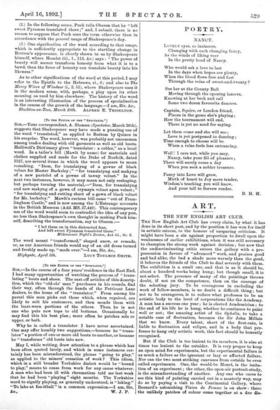[To THE EDITOR OF THZ " SPECTATOR"]
SIR,—Your correspondent, A. Sloman (Spectator, March 26th), suggests that Shakespeare may have made a punning use of the word "translated," as applied to Bottom by Quince in his surprise. The word, however, was probably not uncommon among trades dealing with old garments as well as old boots. Halliwell's Dictionary gives " translator : a cobler," as a local word. In a tailor's bill (Mawlt by name) for materials and clothes supplied and made for the Duke of Norfolk, dated 1527, are several items in which the word appears to mean remaking. "Item, for translatyng of a gowne of black veluet for Master Barkeley ;" "for translatyng and makyng of a new partelet of a gowne of tawny veluet." In the next two instances, however, it may mean not only reshaping, but perhaps turning the material,—" Item, for translatyng and new makyng of a gown of crymsyn veluet apon veluet ;" "for translatyng and cutting short of a gown of black velaet for Mr. barkeley." Mawlt's curious bill came "out of Fram- lingham Castle," and is now among the L'Estrange accounts in the British Museum (Add. MS. 27,44). This contemporary use of the word would seem to contradict the idea of any pun, no less than Shakespeare's own thought in making Pack him- self, describing the transformation, say to Oberon :—
"I led them on in this distracted fear, And left sweet Pyramus translated there." Midsummer Night's Dream, Act iii., Sc. 2.
The word meant "transformed," shaped anew, or remade, or, as our American friends would say of an old dress turned and freshly made up, "made over."—I am, Sir, &c.,
































 Previous page
Previous page